
There were multiple draws on the top boards in the open section and many wins in the women’s section today. Only Tan Zhongyi and Anna Muzychuk have maintained their 100% score, with a massive tie for first place in the open section. Some players took risks; others didn’t, producing a mix of exciting and theoretical games in Round 3
The fourth round of the FIDE Grand Swiss was visited by His Excellency Sir John Lorimer, Lieutenant Governor and the King’s representative on the Isle of Man. He walked around the tables for a venue tour and had pleasant conversations with the tournament director Alan Ormsby, the FIDE Delegate Jeroen van den Berg and FIDE’s CEO Emil Sutovsky. The esteemed guest also paid a visit to the broadcast room, enjoying the live commentary of the games in progress.

The visit happened after the start of the round, and while the players may have been aware of the visit, their opening choices didn’t seem affected by the occasion. On board one, Erwin L’Ami was somewhat surprised (meaning before the game he didn’t revise his notes on that particular variation – make no mistake, these players have analyzed everything, so it is only a matter of memorizing those notes) by Fabiano Caruana’s choice of the …a6 line in the Queen’s Gambit Declined, arising after 1.d4 d5 2.c4 e6 3.Nf3 Nf6 4.Nc3 a6.
L’Ami went for the Carlsbad structure by taking on d5, and Caruana sprung another minor surprise by developing the knight on the c6-square.
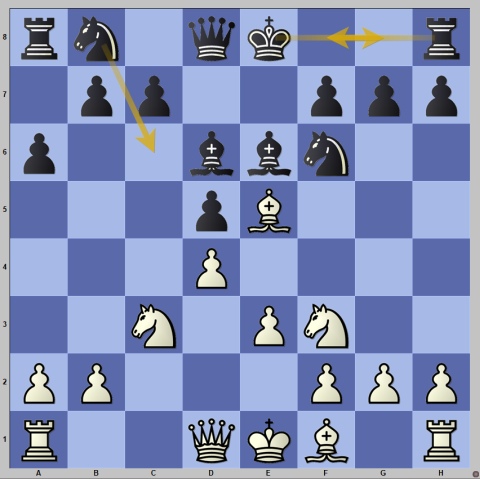
Instead of the more common 8…0-0 followed later by Nd7, Caruana played the rare 8…Nc6!?, a move played by his compatriot and a participant of the tournament, Jeffery Xiong.
The Carlsbad structure was soon transformed. After Black jumped on e4, a couple of light pieces were traded, and the following position appeared on the board.
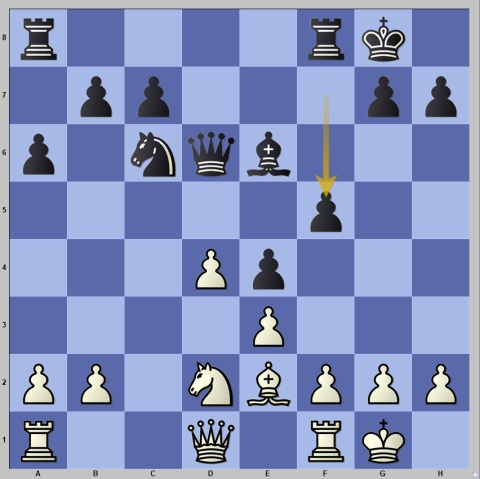
Soon, the queens and the light pieces were exchanged, leading to an equal double-rook endgame and a draw.
On board two, Arjun Erigaisi’s 1.e4 was met by Alexey Sarana’s Petroff. Sarana is a well-known Najdorf player, but here he opted for solidity. White went for the aggressive 5.Nc3, and soon the opponents castled to the opposite sides. In a well-known position, Sarana deviated from the main moves 10…c5 and 10…Re8 in favour of the third suggestion by the engine:
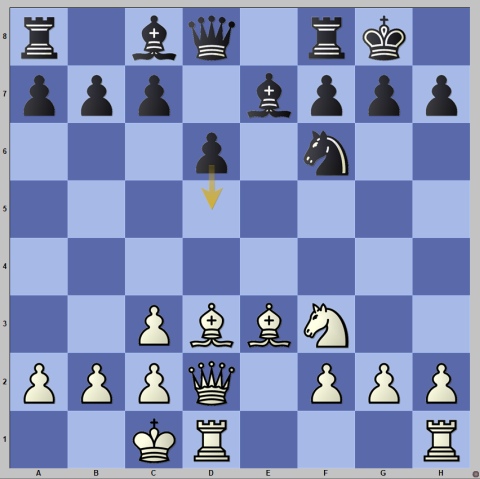
Sarana opted for 10…d5, a move played several times by Wei Yi in 2019. The game soon left theory, and in the middlegame, Black sacrificed a pawn in order to establish a blockade on the dark squares.
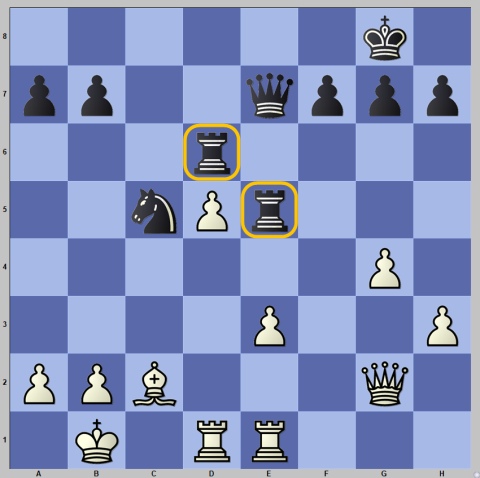
Black’s compensation is obvious as White cannot establish any control over the dark squares. After a lot of manoeuvring, White managed to first get into a double-rook endgame and then into a rook endgame and certainly improved his chances. However, as everybody knows, all rook endgames are drawn.
On board three, a quick draw was agreed in the game between Andrey Esipenko and Alexandr Predke. This was a result of Black’s excellent opening preparation. In a long theoretical line of the Rossolimo that the engines evaluate as clearly better for White, Predke dug deeper and realized that Black, in fact, has a fortress-like position.
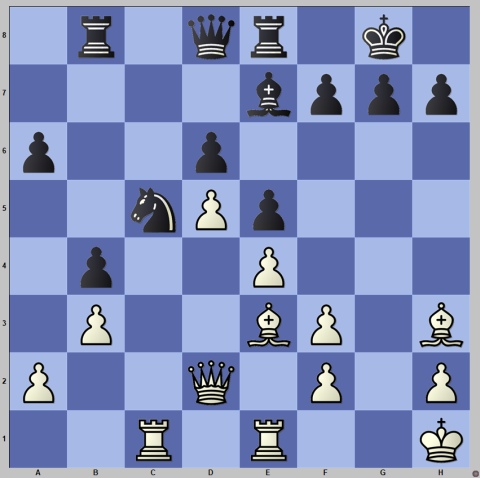
White’s only active plan is to try to push f4, but Black is ready to deal with this. Therefore, Esipenko found nothing better than repeating moves with 22.Bg5 Be7 23.Be3 Bf8.
Rest assured that Predke also knew how to deal with White’s plan of f4. An instructive example of a modern opening preparation!

The surprise leader, Ramazan Zhalmakhanov, faced the stern test of playing Alireza Firouzja with the black pieces. The rating favourite chose the Catalan and had a lasting pressure on Black’s position, which the exchanges of all the pieces but the rooks didn’t entirely diminish.
The game saw a curious double-rook endgame.
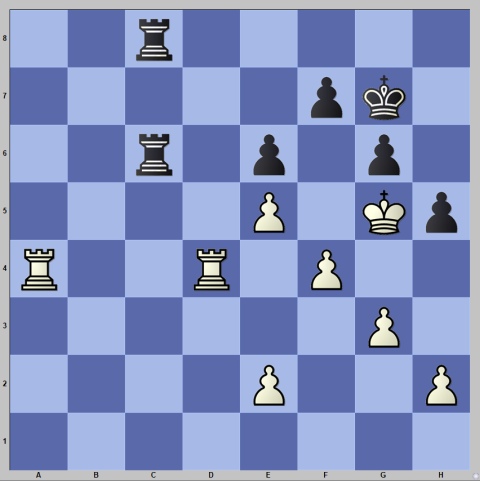
Objectively, this is a draw, but White continued to press. Still, Zhalmakhanov deserves full credit for not buckling under the pressure and holding a draw.
Anish Giri’s strategy against Etienne Bacrot is worth noting. Bacrot is known for his propensity towards time trouble, so Giri decided to surprise him early on, first by selecting the King’s Indian Attack after 1.e4 c5 2.Nf3 e6 3.d3, and later by playing the seemingly random move 7.a4. The intention was to give his opponent something to think about from the start.
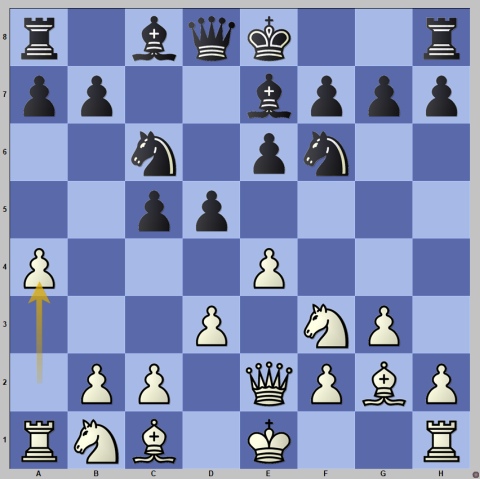
The move is only seemingly random – to discover the secret of its origin, switch on the engine, and you will discover that along with the natural and theoretical 7.0-0, it is the second line! (Depending on hardware and depth, it may also be the first.) Elite players pay attention to every suggestion of the engines.
This approach bore immediate fruit as after spending tons of time, Bacrot decided to change the course of the game by 7…dxe4 8.dxe4 e5, but this weakened the d5-square and gave White a long-term target to aim for. Giri increased his advantage to quite some extent, but in spite of his usual time trouble, Bacrot held firm and managed to hold a draw.
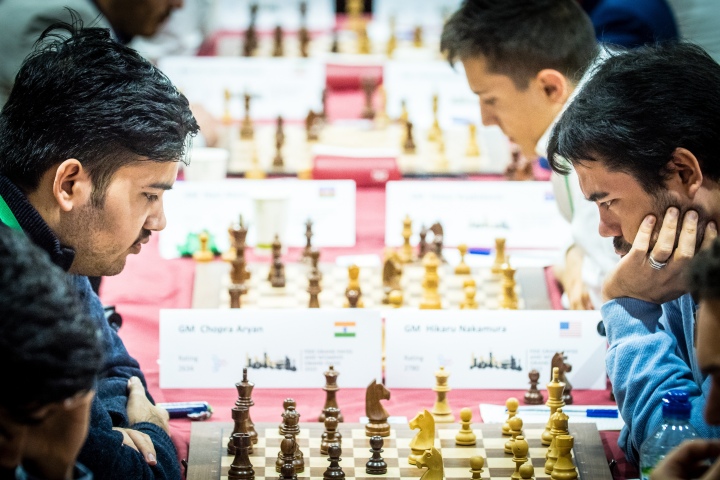
Hikaru Nakamura scored his first win against Aryan Chopra, but not without squandering a solid advantage first.
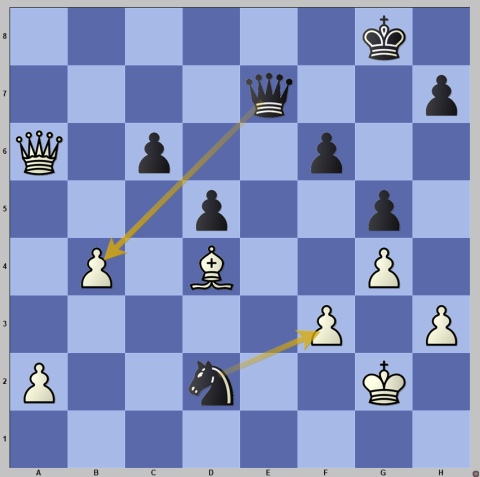
Here, Black missed his last chance. In spite of having a lot of time after the control on move 40 he didn’t find the saving 41…Nxf3! and went for the other pawn with 41…Qxb4? which failed to 42.Qd3! and Black was losing due to the problems with the knight and the weak pawns on the kingside.
In the women’s section, in the duel on board one between Tan Zhongyi and Antoaneta Stefanova, Black obtained good play against White’s hanging pawns. In a tense middlegame, Stefanova was undone by granting White a crucial tempo.
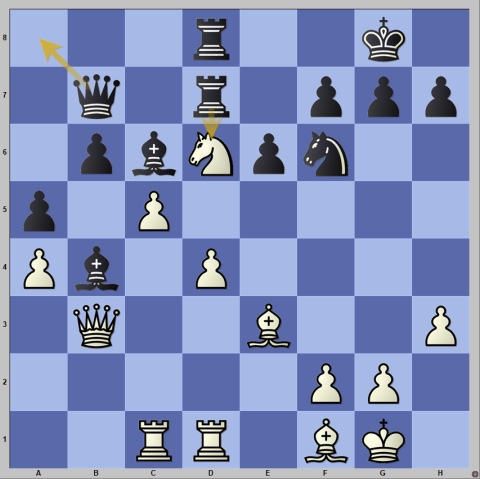
Black wasn’t even forced to let the knight on d6, but once there, it had to be eliminated immediately with 23…Rxd6! 24.cxd6 Qd7. After taking the d6-pawn, Black would have had a good compensation thanks to control over the blockading square.
Instead, Stefanova waited with 23…Qa8? but after 24.Bg5! Kh8 25.Qg3 she was already in trouble as taking the knight now (it was better not to!) led to the wrecking of her kingside structure with Bxf6. White soon wrapped up with a direct attack with Qh4 and Bd3.
On board two, Irina Bulmaga used Ian Nepomniachtchi’s idea in the Ruy Lopez that he used in the first game of his match with Ding Liren. Anna Muzychuk deviated from Ding Liren’s play and obtained good play. On move 17, White could have repeated moves, but Irina decided to continue the game, having in mind a tactical trick that wasn’t entirely sound.
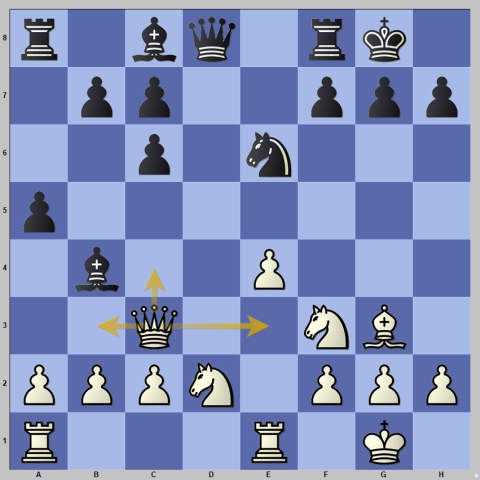
The players already repeated the position once by playing Qe3 Bc5, Qc3 Bb4, but here Bulmaga thought for almost half an hour and went for 17.Qb3?! (White could have avoided repetition with 17.Qc4). After the forced 17…Bxd2 18.Red1 Nd4! 19.Nxd4 Qxd4 20.Bf4 Black had the strong move 20…Be6! that won her a pawn since White must play c4 to ensure that she gets the piece back, but by doing so, she loses both pawns on c4 and e4.
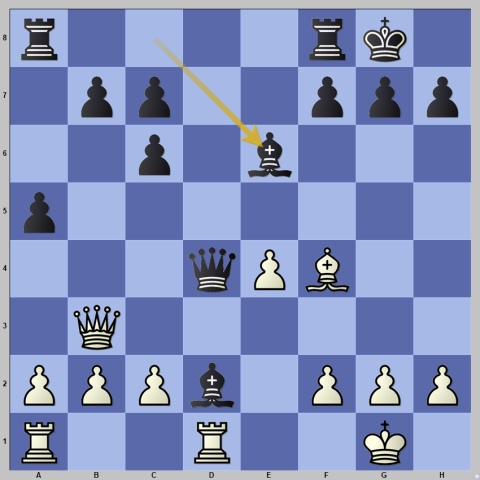
Black converted her material advantage, though not without inaccuracies that made a win problematic at a certain point.
On board three Elisabeth Paehtz used a set-up in the English Opening that Kramnik has used in his post-retirement online games. Her opponent, Meruert Kamalidenova, developed in King’s Indian style, but in the middlegame, the rating favourite was stronger and scored her second win. After three rounds, Elisabeth is just a half-point behind the leaders.

The game between Pauline Guichard and Mariya Muzychuk on board four was a very sharp Semi-Slav where White had an accidental winning opportunity on move 28, but it was so complicated that both players missed it. Pauline got a second chance in a severe time-trouble.
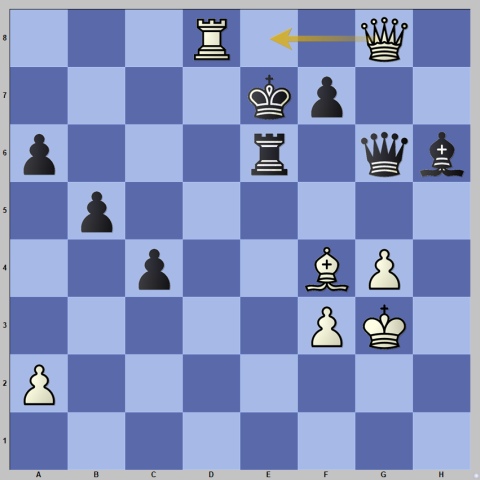
Here, White had a very pretty forced win with 37.Qe8 Kf6 38.g5! Bxg5 39.Qh8 Ke7 40.Bd6! Rxd6 41.Qf8 with Rxd6 next, winning the queen.
Despite spending two minutes on her move, Guichard didn’t find the win and repeated moves with Re8-d8 with a perpetual check.
The game of the day was the clash of Rameshbabu Vaishali and Leya Garifullina. It all started with White’s original and creative concept to castle queenside in the Grand Prix Attack.
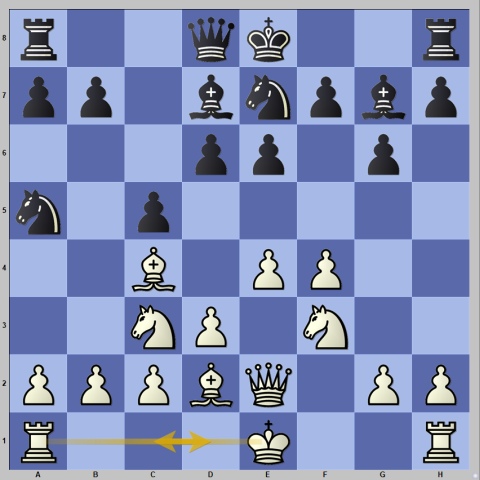
Here White’s continued with the daring 9.0-0-0!? Engines are dismissive of White’s idea, and for some time, Garifullina played the best moves. But Vaishali wreaked havoc on the board:
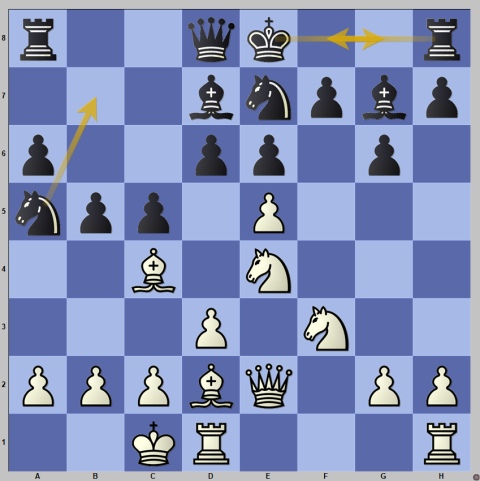
Here, Black has to castle, but then things don’t get any simpler after 14…0-0 15.Qe1 or 15.Bg5. Garifullina defended the pawn on d6 with 14…Nb7?, but that gave White a big advantage after 15.Bg5 (taking on d6 with the pawn was also strong) Bc6 16.Bxe6!
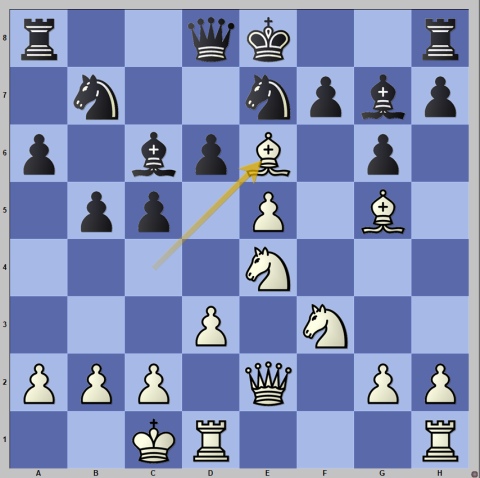
However, the game continued to be extremely complicated. Both players missed the best moves, leading to wild swings in the evaluation.
After Black’s 16…Bxe4, the simple 17.dxe4 would have kept White’s decisive advantage, but after 17.exd6? Black could have stayed in the game with 17…Qxd6! However, Leya had to foresee that she wouldn’t lose a piece in the forced line after 18.Qxe4 Qxe6 19.Qxb7 0-0:
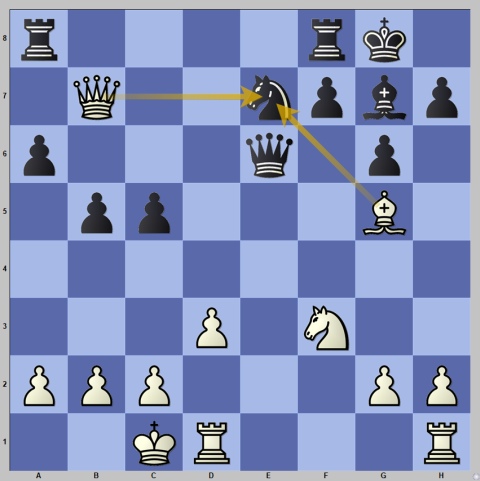
Here 20.Qxe7 is met by 20…Qa2 with an attack on the pawn on b2, while 20.Bxe7 Rfb8 21.Qc7 Qxa2 is similar.
Garifullina missed this chance, and after 17…Nxd6? 18.dxe4 White had a decisive attack with equal material.
Top seed Aleksandra Goryachkina scored her first win against Divya Deshmukh thanks to her superior knowledge of a long forced line in the 5.Bf4 variation of the Queen’s Gambit Declined. Black forgot her theory on move 25, after which she was immediately lost.
Former World Champion Aleksandra Kosteniuk couldn’t do more than an early repetition against Eline Roebers’s French Winawer.
The open section no longer has players on 100%, while the women’s section, Tan Zhongyi and Anna Muzychuk, still have a perfect score. A close race lies ahead, with eleven players tied for first place in the open section and only two leaders in the women’s tournament.
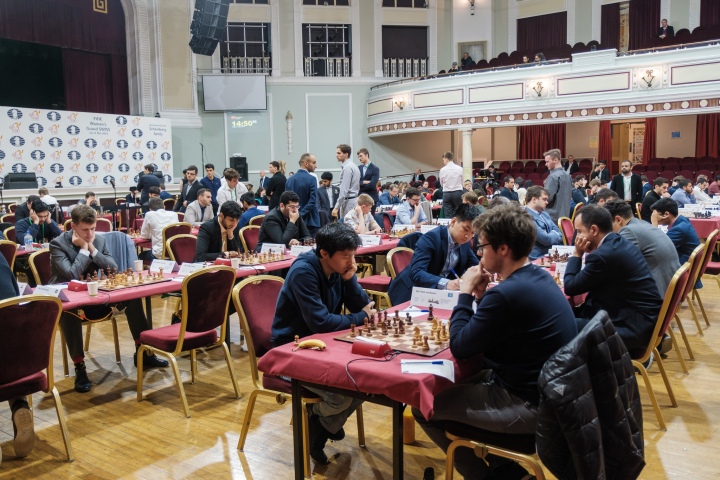
Fans can follow the Grand Swiss 2023 by watching live broadcasts of the event on FIDE Youtube and Twitch with expert commentary by GM David Howell and IM Jovanka Houska.
Round 4 starts tomorrow at 14:30 PM local time.
Written by GM Alex Colovic
Photos: Anna Shtourman, John Saunders
Official website: grandswiss.fide.com






More Stories
Full list of participants for 2024 WRB announced
Gukesh D crowned 18th FIDE World Champion
FIDE World Championship Game 14: Gukesh D crowned 18th World Champion
FIDE World Championship Game 11: Ding collapses under pressure as Gukesh takes the lead
FIDE World Championship Game 9: The calm after the storm
Full list of participants for 2024 WRB announced